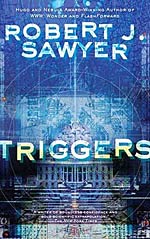
![]() Tar Daddoo
Tar Daddoo
2/26/2013
![]()
What is the Science Fiction Premise?
Suppose that as a consequence of some critical event, one person could access the memories of a specific other person. Furthermore, suppose that the event affects several people such that each can read one other person in the set, but that person cannot read them. Finally, suppose further that one of the affected people is the president of the United States.
Is the science of the premise explored?
The science of this phenomenon is not understood by the characters in the story, but it is explored fairly thoroughly. Although the explanation of why the phenomenon occurs requires some suspension of disbelief, the descriptions of what it might be like to read someone else's thoughts are in keeping with current beliefs about human memory. The author accurately appreciates the associative nature of memory (we need a trigger to access a memory) and the reconstructive nature of memory (we do not remember everything, but rebuild the memory from sparse details.) From a scientific point of view, these discussions of the phenomenon of human memory are where the book shines. When it strays into the physiological nature of memory, the result is less satisfying.
Through roughly half the story, the mystery behind these new capabilities is explore revealing a system that explains what is happening and how it is constrained. Then, the author breaks the first rule of any good mystery; the facts change in ways we could never have anticipated. For me, the story derails as we move in on the climax.
Is the impact of the premise on an individual explored?
The author does a good job using his twenty or so affected characters to explore the implications of reading other people's memories or having your memories be read. There is embarrassment, hidden secrets revealed, a desire to solve other people's problems, and much more. Obviously, the author cannot commit to fully developing all twenty characters, but even as vignettes the implications are clear and easy to appreciate. You are often compelled to ask yourself what you would do, if you were constantly reading someone else's memories.
Is the impact of the premise on society explored?
The impact is explored in three ways. First, we have the straightforward problem of what it might mean to have someone reading the memories of the president of the Untied States. Presumably, if there is a clear case for secrecy, it lies here. Indeed, there is an entire government apparatus for the purpose of preserving that secrecy.
Second, we have the more subtle issue that society is built on how we treat one another and this is driven by what we know about one another and what we assume others know about what we know. While it might be scary to think that someone can read our memories, knowing that someone understands us deeply and still wants to stay around can be gratifying, healing, and fulfilling. The book asks us to consider whether it is more valuable to have our privacy or to have someone else who fully appreciates us.
Third, in that part of the story where things derail, the author shows a deep interest in what this could all mean for society. I will not say more for fear of harming the story.
How well written is the story?
I have read a lot of Robert Sawyer's books and I always enjoy the writing. Triggers is no different in this regard. The stye is clear and direct. He keeps the action moving. And, he folds in his science intelligently. Triggers is perhaps a little more challenging because there are so many characters to work with. Frankly, I was a little surprised at how well I kept everyone straight.
Can I recommend the book?
By now you can probably tell that I am a little disappointed with Triggers. This stems, in part, from the high expectations Sawyer's earlier works have engendered. My memory could be failing me, but Factoring Humanity, Flashforward, Calculating God, Mindscan, Rollback, and Illegal Alien seemed solid from beginning to end. I do not remember that sense of becoming derailed. If you haven't read any of these earlier books, go try one of them and don't start with Triggers.
Of course, if you are very familiar with Sawyer's work, you'll make up your own mind about Triggers. All I can say is that while I do not regret reading the story, I do wish he had kept it a good mystery.
Tar Daddoo